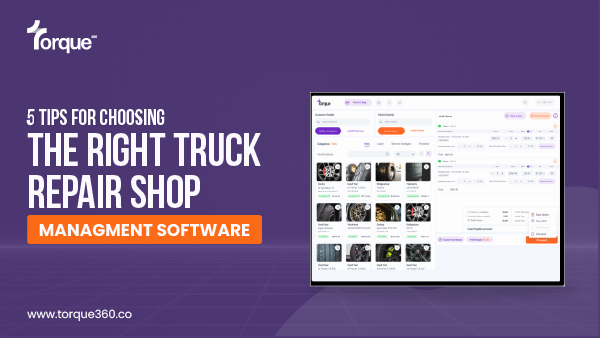Introduction
Technician Management Software has significantly transformed how automotive businesses manage technician tasks. By automating task assignment, tracking progress, and streamlining workflows, this software has become an essential tool for repair shops. One such solution, Torque360, provides a range of tools that help manage these tasks effectively while improving productivity.
Using Technician Task Management Software ensures seamless handling of scheduling, communication, and performance tracking. From assigning jobs to monitoring task completion, the right software makes every step efficient and transparent. This article explores how you can utilize such a tool to manage technician tasks with precision.
1. What is Technician Management Software?
Technician Management Software is designed to manage and optimize the tasks technicians perform in their daily operations. It integrates essential features such as scheduling, task monitoring, and real-time communication into a single platform. Tools like this are especially useful in the automotive industry, where efficiency and customer satisfaction are paramount.
2. Key Features of Technician Management Software
Effective software offers several essential features to simplify task management:
- Centralized Task Assignment: Assign tasks based on availability and expertise.
- Live Updates: Monitor task progress without manual follow-ups.
- Skill-Based Allocation: Match the right technician to the right job.
- Data Analytics: Access performance insights for better decision-making.
Automotive News reports that implementing task management software can reduce repair turnaround times by up to 30%.
3. Optimize Task Assignment
Assigning tasks manually can lead to inefficiencies and errors. Technician Management Software automates this process by analyzing technician availability, expertise, and workload. Automated allocation ensures each task is handled by the most qualified team member, enhancing productivity and minimizing delays.
4. Improving Scheduling
Scheduling plays a vital role in a shop’s daily operations. Advanced scheduling tools allow managers to:
- View real-time availability of all technicians.
- Prioritize urgent jobs to meet deadlines.
- Adjust schedules with minimal effort when changes occur.
This level of organization prevents bottlenecks and keeps work flowing smoothly.
5. Streamlining Inventory Management
One common issue repair shops face is delays due to unavailable parts. By integrating inventory management, Technician Management Software ensures technicians have the tools and materials they need. Automatic stock alerts prevent shortages, allowing repairs to proceed without interruption.
6. Monitor Technician Performance
Performance tracking is critical for maintaining operational efficiency. With detailed insights, managers can analyze metrics such as:
- Task completion rates
- Customer satisfaction scores
- Time taken per job
These reports enable better decision-making and help recognize technicians who excel while identifying areas for improvement.
According to AutoShop Insights, businesses using performance tracking tools report a 25% boost in productivity within the first year.
7. Facilitating Clear Communication
Miscommunication between technicians and managers can lead to costly mistakes. Technician Management Software bridges this gap with features like:
- Internal Messaging: Share updates or clarifications instantly.
- Status Updates: Technicians can inform managers of progress in real time.
Clear communication keeps everyone aligned, reducing errors and delays.
8. Enhancing Customer Experience
Satisfied customers are the backbone of a successful automotive shop. With better task organization, technicians can complete jobs faster and more accurately. Real-time updates also ensure customers are informed about their vehicle’s status, fostering trust and loyalty.
9. Access Anywhere with Cloud-Based Platforms
Many of these solutions are cloud-based, enabling access from anywhere. This flexibility allows managers to oversee operations remotely, ensuring consistency across multiple locations.
10. Simplified Reporting and Analytics
A robust reporting system helps managers track key performance indicators. By analyzing data trends, businesses can make informed decisions, such as optimizing workflows or investing in additional training.
11. User-Friendly Design
Adoption of new technology can be challenging, but most Technician Management Software tools are designed with user-friendliness in mind. Intuitive interfaces reduce the learning curve, allowing technicians to adapt quickly.
12. Cost Savings
Automating repetitive processes reduces operational costs. These savings, combined with increased efficiency, make such software a worthwhile investment for businesses of all sizes.
13. Reducing Errors
Manual task management is prone to human error. By automating processes, Technician Management Software minimizes mistakes, leading to smoother operations and fewer disruptions.
14. Scaling for Growth
As your business grows, so do its operational demands. Scalable software can expand with your needs, accommodating more technicians, locations, and tasks without compromising performance.
15. Tailoring Solutions to Your Shop
Every shop operates differently, and good software should reflect that. Customizable features allow managers to adapt workflows, create personalized reports, and integrate existing systems for a seamless experience.
Conclusion
Technician Management Software is a must-have for automotive repair businesses aiming to improve their workflow and efficiency. By streamlining scheduling, communication, and performance tracking, it allows teams to work smarter, not harder. Whether you’re a small shop or a large enterprise, this software offers the tools you need to manage technician tasks effectively and enhance customer satisfaction.




